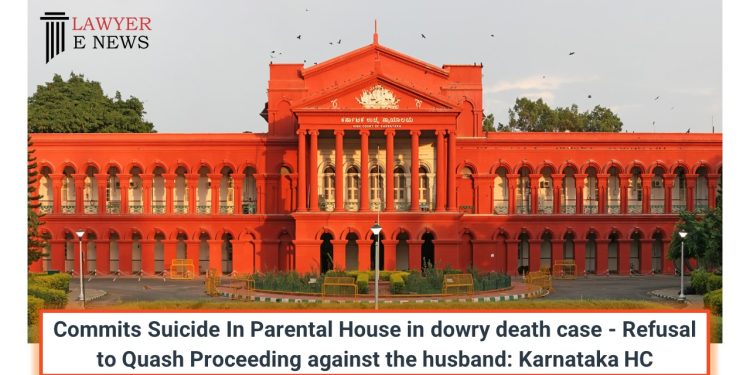Commits Suicide In Parental House in dowry death case – Refusal to Quash Proceeding against the husband: Karnataka HC

D.D:08-07-2022
The Karnataka High Court has denied a husband’s petition to quash a dowry death case registered against him under Sections 304B and 498A of the Indian Penal Code, after his wife, who had been living separately from him for over two years, committed suicide in her parents’ home.
Justice M. Nagaprasanna, sitting alone, dismissed the petition filed by one Niranjan Hegde, stating that the existence of seriously disputed factual issues in the case necessitates a “full-blown trial” and that there is no reason to halt the proceedings at this time. “The contention is that it should be’soon before death,’ and that’soon before death’ must be interpreted as ‘immediately before death,’ and that the decedent’s departure from the matrimonial home two years ago does not mean ‘immediately before death,’ are all unpersuasive, as it is too implausible to be considered at this time,” the court stated.
The bench also stated, “The present case is also one where the complainant has placed on record such material that would require further proceedings to be continued against the petitioner, and the petitioner has not placed on record any document that is so unimpeachable and of sterling quality that would necessitate quashing of entire proceedings at the stage of FIR registration itself.”
According to the complaint filed by the father of the deceased, the couple wed in 2017. The relationship between the wife and the husband did not go well immediately after the wedding, and they had significant compatibility issues. When incompatibility became inevitable, the complainant’s daughter appears to have left the marital residence and moved in with her parents in Bangalore. All reconciliation efforts that lasted more than two years are said to have failed.
Regarding irreconcilable incompatibility Both the petitioner and the complainant’s daughter filed a joint petition for divorce under Section 13B of the Hindu Marriage Act, accompanied by a request to waive the six-month cooling off period.
During the pendency of the aforementioned petition before the Family Court, the Petitioner’s wife committed suicide by hanging herself in her parental home’s bedroom, and a suicide report was filed with the local police. On account of the aforementioned incident, a complaint was filed against the Petitioner-husband under Sections 304B, 313 and 498A of the Indian Penal Code.
Advocate Arun Govindaraj, representing the petitioner, argued that the daughter of the complainant left the matrimonial home and now resides with her parents due to the husband and wife’s strained relationship for more than two years. The family of the complainant also has an internal conflict.
The complainant maintained that the investigation is ongoing. At this stage, it is only necessary to determine whether the complaint prima facie meets the requirements of Section 304B of the IPC. In addition, other alleged violations of Sections 313 and 498A of the IPC are all cognizable.
Findings:
The bench reviewed the complaint and cited Supreme Court decisions before stating, “The complaint states that on the evening of 12-06-2022, just prior to the tragic event, she spoke with her husband. Whether the conversation with the husband before her death led to her committing suicide or whether years of collective harassment culminated in her committing suicide is a matter that must be tried, as the complaint describes instances that could constitute Section 304B of the Indian Penal Code.”
Then the phrase “In addition to other offences, the FIR includes offences punishable under Section 304B of the Indian Penal Code. Primarily, the complaint and the narrator indicate elements of Section 304B of the IPC.”
In addition, the bench considered the transfer of funds by the defendant’s father-in-law to his bank accounts and stated, “There are now documents indicating the transfer of funds from the father-in-law to the son-in-law. Consequently, the essential elements of all crimes are present for the purpose of registering the crime and conducting an investigation.”
The court held, “As there are unquestionably a plethora of seriously contested factual issues, the matter involving such a grave offence that can be gleaned from the available records cannot be introduced at this time. As the couple got married in 2017 and the complainant’s daughter commits suicide on June 12, 2022, the essential element of death occurring within the first seven years of marriage is present in this case. What drove the daughter to commit suicide, whether cruelty or dowry demand, will be determined in a full-scale trial.”
Consequently, the court denied the petition.
NIRANJAN HEGDE
Versus
THE STATE OF KARNATAKA






